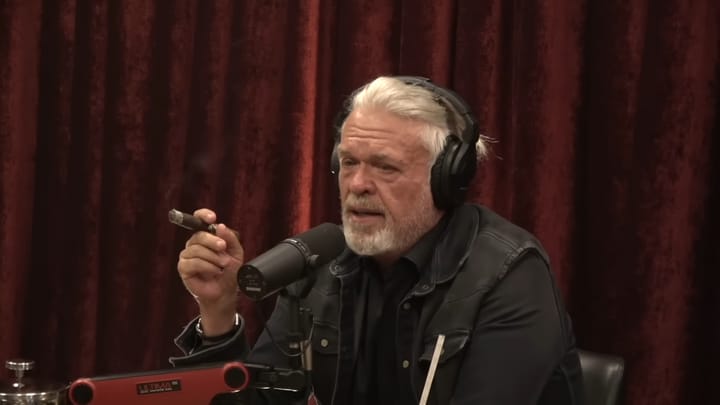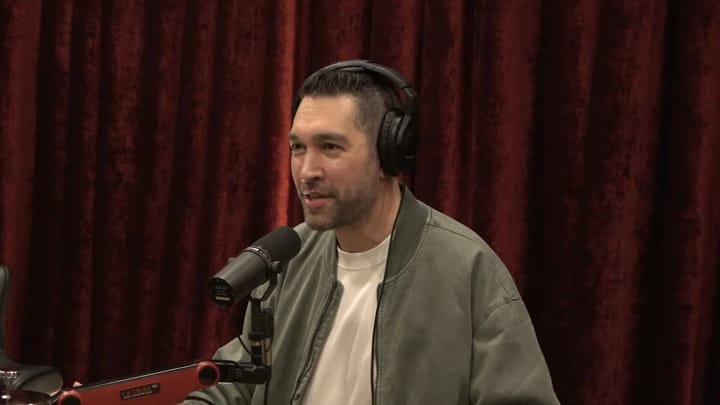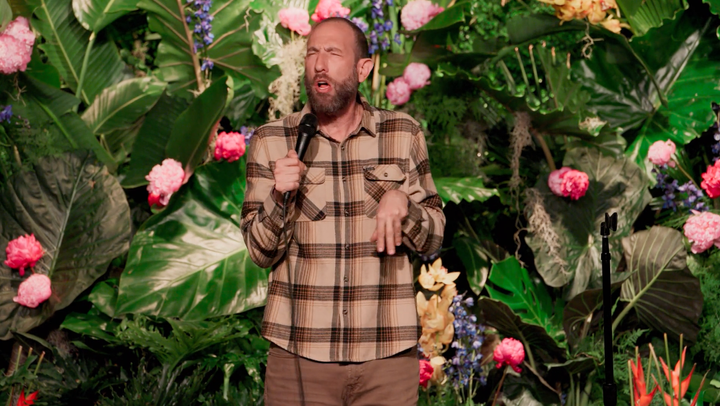"You Can't Bury Your Head in the Sand": Why Right-Wing Comedy Matters
An interview with the authors of That's Not Funny.

If you missed Wednesday's newsletter about the latest development in the Horatio Sanz case, read it here.
Last month, in Reno, a bloc of the Libertarian Party known as the Mises Caucus won control of party's national organization. As I’ve written before, the Mises Caucus is an openly reactionary movement that’s been working to take over the Party for several years, in part by pursuing the removal of socially progressive elements from the state and national organizations—a goal reflected in the new leadership’s removal of the sentence “we condemn bigotry as irrational and repugnant” from the party platform shortly after taking power. Many of the caucus’s high-profile members are proudly anti-woke, by which I mean opposed to the expansion of civil rights for and general dignity of marginalized groups, and frequently use their platforms to traffic in racism, transphobia, and other forms of hate speech. One of them, a US Senate candidate in New Hampshire, runs a company that owns what the Southern Poverty Law Center describes as “a YouTube alternative that hosts far-right and neo-Nazi content.”
So what? As the SPLC notes, the Libertarian Party is relatively small, averaging around 1% of the vote in federal elections and a high of 3.3% in 2016. Who cares if a marginal political party is overtaken by far-right lunatics? Aside from the fact that far-right lunacy is bad in and of itself, Jeet Heer makes a compelling case in The Nation that the Mises takeover stands to bring about the bankruptcy and collapse of the Libertarian Party, which in turn stands to “help consolidate the right-wing vote around the Republican Party,” funneling its far-right flank into a GOP that’s already leaning on far-right activists for help retaking power—in some cases, as on January 6th, through illegal and violent means. “The Mises Caucus are the nominal winners in the internecine libertarian wars,” Heer concludes, “but the ultimate beneficiary could be Donald Trump.”
It is worthwhile, then, to consider who exactly the Mises Caucus appeals to and how it has gone about recruiting them. Fortunately, the Caucus’s founder, Michael Heise, was very forthcoming about these questions in an interview with Reason, telling the magazine that “the basic vibe they are seeking is online youths into edgy comedic podcasts, a new counterculture for whom the old L.P. holds little appeal.” But wait, there’s more: “Heise believes that the current rumored frontrunner for a Mises Caucus-approved presidential nominee in 2024, comedian and podcaster Dave Smith, is so well-connected to the Joe Rogan world that legacy respectable mainstream media will be meaningless for party messaging moving forward.”
It is with all this in mind that I will transition to the subject of today’s newsletter, an interview with communications professors Nick Marx and Matt Sienkiewicz, the authors of That’s Not Funny: How the Right Makes Comedy Work for Them. A painstakingly researched tour of the right-wing comedy ecosystem, from Last Man Standing to The Joe Rogan Experience and The Babylon Bee to The Daily Shoah, the book argues that liberals underestimate the reality of that ecosystem. When we write off conservative humor as simply unfunny, Marx and Sienkiewicz write, we ignore its true power, a power that the right is leveraging quite effectively as we look the other way.
This interview has been edited for brevity and clarity.
So the book is centered around this critique of the center-to-left’s tendency to dismiss right-wing comedy as not funny and therefore not a serious cultural and political phenomenon. To me this seems to reflect a broader tendency by right-wing comedians, their fans, and even those on the other side—e.g., my parents when I beg them to stop watching Jimmy Kimmel—to dismiss comedy as this frivolous thing that doesn't actually affect how people think about the world. What do we know about how comedy actually informs people's beliefs and social relations?
Sienkiewicz: The first thing to say is we don't know very much concretely. There are people who try to study it sort of scientifically, and there are limitations to what you can do with that kind of research. I think that there are moments which clearly have these at least discourse-shaping attributes. If you think of Tina Fey as Sarah Palin, I'm not going to be confident in saying how people voted or didn't vote, but I will say people understood Sarah Palin at least in part through the lens of that performance. And I think we can look at Trump and the way that he was treated by the mainstream comedy world normalizing him—or attempting to fit him into a discourse of normality—through the use of comedy.
The thing that I'd be confident to say is that comedy is a space in which ideas and perceptions can be normalized, then built on in more concrete political spaces. There's probably too many steps for me to be confident in saying, "Okay, this happens in the comedy world, so this happens at the ballot box," but I'm very confident that the way that we talk about politicians, that we talk about issues, gets shaped through comedy.
Marx: The nerdy word we as academics fall back on is discourse. It's this discursive framing. It introduces and provides new language tools for people to grapple with a contentious political issue that they might not have had, had Colbert or Stewart or someone not given them a joking framework to work through it.
In the same manner that the left dismisses conservative comedy as just not funny, people in that right-wing world will dismiss not just left-wing comedy, but pretty much anything they consider illegitimate as also not funny, and therefore not worth engaging with. What do you think it is about funniness, as a quality or a mode of communication, that people get so attached to?
Marx: Comedy creates in-groups and out-groups. It's extremely tribal. It allows us to quickly and strongly form affiliations with other people that other cultural formats don't. And that has a long history in the literature, it's got social science backing. It raises our adrenaline levels, and we have a visceral response to laughing and comedy that I think other forms of cultural interaction don't have that same kind of strong adhesion, at least not in an immediate sense.
One of the first stops in your tour of the right-wing comedy world is this notion you coin of paleocomedy. Could you talk a bit about how you arrived at that conceptualization of comedians trying to reenact a pre-problematic school of comedy?
Sienkiewicz: My experience of coming to believe this is a worthwhile concept is just where the chapter of the book starts. It really was that Mike Huckabee thing, and then watching Patton Oswalt dunk all over that, and then having this experience like, “Well, of course, everybody knows that these jokes are bad.” Nobody is sitting around thinking this is clever, or cutting edge, or whatever. There's something else that's comforting about it, something else that's interesting about it to a certain group of people.
And then the utter rehash nature of it. It points to the idea that people are looking to not be surprised, to not feel challenged. I'm basically just copying the book, but it really was the experience [of] listening to Dennis Miller recreate an AM radio show in a podcast in 2020. The idea that there's no reason you have to do that, but there's something comfortable about it, and there's something comfortable about putting comedy in there.
Marx: It's the conservative safe space. You mentioned pre-problematic. That’s the language to harp on. I don't know how much Last Man Standing you've suffered through, but Tim Allen has three heart-on-sleeve lib daughters. One of them is married to a meathead character who is just like, "Mike, why don't you recognize my pronouns?" It ultimately is the comedy of privileged upper middle-class boomer men, these white men who used to dominate comedy clubs in the '70s and '80s, who just want to go back to that enclosed safe space, and didn't want to have to worry about giving Hannah Gadsby their set, and worry about pronouns. It's comedy of agedness, privilege, wealth, and white patriarchal authority.
Sienkiewicz: Another reason that I think we were attracted to the concept is that it pushes away from the idea of thinking about comedy as this series of if/then statements that make jokes work and not work. I love mapping out jokes, but sometimes there's a meta thing going on, and comedy is representing not a series of switches in the brain, but a habitus, a space in which you want to be and feel in a comic mood, even if the jokes aren't that great. There's something about the environment of comedy—you can't dismiss it by saying, "Oh, he's not really going through the right steps to create an ironic, comedic joke." You say, "No, he's creating a space that people associate with comedy and they feel comedy, even if it's not skillful in the sense that we might as comedy nerds be really excited about."
What did you learn in your research about how fandoms operate? How do they operate in new ways as new tech platforms give home to these sorts of comedy?
Sienkiewicz: The digital distribution space allows people who are relatively few in number, but have a similar way of viewing things, similar taste, to come together in a way that you never could have in the past. And that creates at least the appearance of a really strong fan base that kind of looks like an old school fan club, but that would've been formed through mass media and require much more breadth of interaction.
The thing that I would connect it to is the business models. The business model of most of these podcasts is to garner what in old media terms is a tiny audience, today is still a pretty small audience, but really get them excited, really make them feel like they're part of something, like when they're subscribing to this or that platform, you're not just buying a movie ticket, you're instead joining up for a cause. Why else would you go out of your way to start an account to sign up for a relatively small podcast unless you felt like it was really something special and committed?
And this could be a really good thing, in that it allows comedians to develop these in-jokes and world-creating things, which I think is a really interesting, innovative space for comedy. It also allows people to really make this part of their identity. They're literally invested in it. And they support it too. If I insult your favorite SNL character, you're not paying his salary. Whereas if we even say something—which I would not call an insult, necessarily—descriptive in a way people don't like about a podcaster that somebody is sending their Patreon money to, it's a much closer connection. And I can see how it creates more intensity in certain cases.
I often see comedians more on the liberal to left side say, "You don't have to worry about those right-wing comics and their fans, they're in their little walled gardens. They're not getting Netflix specials. They're not getting industry stuff. So, it doesn't have to concern us." But as you just explained, even though those audiences are smaller, they're qualitatively different. What do you make of this idea that there’s no need to worry about them as a social or political force just because they’re so small?
Sienkiewicz: Well, that's foolish. That's foolish.
It’s silly to me because there’s so much slippage in comedy. You’ve got your Andrew Schulzes and Tim Dillons who are headlining clubs and theaters on one hand, and on the other you’ve got podcasters who sometimes host full-on QAnon people and other times host Louis CK. It’s all just constantly cross-pollinating.
Marx: That's the important thing that we try to drive home in the book and in talking to people about it. The most frequent line of attack we get about Rogan in the libertarian universe is, "Oh, he supported Sanders and he's never voted for a Republican." And, all right, whatever, Rogan has been on mic long enough that he could plausibly affirm or deny any political perspective. But it's the connections. It's the connections to other people, who lead to other people, who lead to the Nazis. And you can't bury your head in the sand and pretend like those connections don't exist. Not only because they do in a material sense of, these people all show up at [the same festival] or whatever, but the algorithm pushes this stuff together for you. The rhythms of social media will continually clump like-minded folks together such that their affiliation becomes undeniable. You cannot simply say, "Well, I had Bernie Sanders on once, therefore I am this type of person." It doesn't add up.
Here’s Joe Rogan talking racist “science” with Holocaust-denier Chuck Johnson. https://t.co/0LJmVU9fPlFebruary 6, 2022
You touched earlier on the victimhood of this world. Someone's always trying to get canceled, complaining about getting canceled, reacting to the threat of the libs and the wokes, it seems to be one animating force throughout all the different stops in the right-wing comedy ecosystem. Another one that comes up pretty clearly in the book is people using comedy as a license to just be a piece of shit, to punch down. Nick, you mentioned in your conversation with Politico that a counterpoint that’s emerged to this, on the liberal side, is this school of comedy where everyone is constantly exhibiting good manners and showing people how to be good. Do you think it’s possible for the left to build a more unifying response whose organizing principle isn't giving permission to be a piece of shit, but also isn't lame and boring?
Marx: I sure hope so. I think our bigger critique of the center-liberal impulse in comedy over the last 20 years is that these institutions have gotten a little stuffy and staid. Colbert moves from his edgy right-wing parody to The Late Show, and folks are becoming more risk-averse and not wanting to take the same chances they did in a previous era, for a whole host of reasons, mainly [that] people are getting paid handsomely off of it. But there's also the thing I mentioned in the piece, that we want more of The Good Place, we want culture to make us feel good. This is our haven, because the political universe is such a nightmare.
I'm a huge fan of Chapo Trap House and the far lefty political comedy voices, not necessarily because I always agree with their politics, but because they're fucking funny. Because they are edgy and they make jokes out of things that really cut into power structures. I think that the more we can nurture voices on the left that still provide some sense of adventure—that aren't self-censoring because they're scared of getting called out by fellow liberals—the better. I think in order to do that, some of the current comedy institutions need to be degraded somehow. They need to suffer financially. They need to fall out of ratings favor. Now, I'm not saying the cancellation thing. I am saying I hope and expect that people get bored of Saturday Night Live, like I have been for the last five years, and that in turn encourages them to hire more Sarah Shermans or Bowen Yangs, that we get more and more of this creep of millennial lefty folks into the liberal mainstream, and maybe that provides some cohesion.
Sienkiewicz: I don't think the center-left comedy institutions are doing very much at all for the liberal world. A degrading of it, in which people then are forced to work together in more interesting ways, and not just figure out what version of liberalism Coca-Cola is interested in, is probably better than what we have now.
Do you think there’s hope for liberal-left comedy to do what we want it to do so long as Fox News exists and social media platforms function the way they do?
Sienkiewicz: I'll try to be optimistic, and then Nick can try to be optimistic. I do think that the current model for comedy in that center-left world probably is unsustainable and probably comes crashing. So, that's the bad news before any possible good news. I similarly do not want to pretend that the current media economics are going to be the media economics in five years or 10 years. The way I look at it now, I see a real disadvantage for anybody who is not pushing towards an edge, and particularly who is not really successful at putting themselves as countercultural. So, there are places on the left that can do that, but that hasn't been the comedy mold.
I hope that comedians are less and less going to look at these few mainstream broadcast things as the place they ultimately want to be. If they start seeing themselves as people who are developing their own brands and places, then you'll get more interesting characters, and they'll inevitably need to link with each other. The ways that the right is succeeding are not inherently a problem. They can have real advantages because they can have people be less beholden to these old institutions. I think that eventually, once you get people [whose] goal is to develop more unique brands as opposed to being part of these major institutions, I think there's some hope for change.
Marx: I don't think comedy alone can accomplish anything. I think it's always existing alongside actual political activism, most importantly material consequence, material change. I think that money has to be crazily redistributed in a way that lifts up more people and puts them in a privilege to have their voices heard before it can do anything to change the political situation. We need to make sure comedy’s reframed as one tool in a broader arsenal of liberal weaponry, alongside policy, material change, raising up of marginalized identities. All those things have to coexist in order for comedy to have any kind of net positive good.
You can buy That's Not Funny at Bookshop or wherever you purchase books these days.
Thank you for reading! Humorism is currently free, but if you like you can drop me a tip via Paypal.
Header image via YouTube/FOX.


